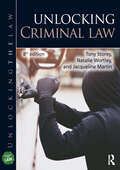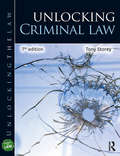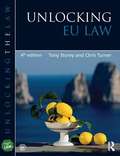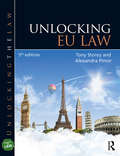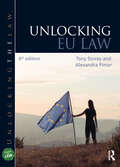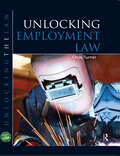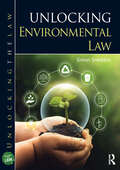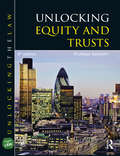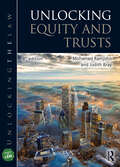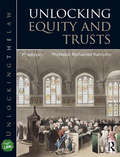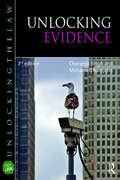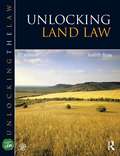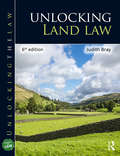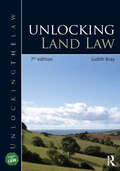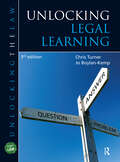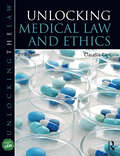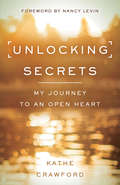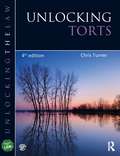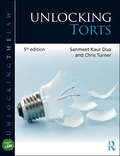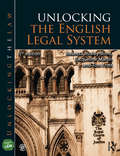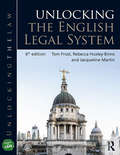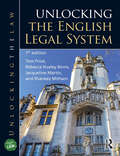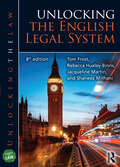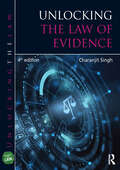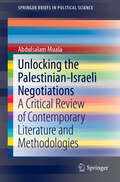- Table View
- List View
Unlocking Criminal Law (Unlocking the Law)
by Jacqueline Martin Tony Storey Natalie WortleyUnlocking Criminal Law will help you grasp the main concepts of the subject with ease. Containing accessible explanations in clear and precise terms that are easy to understand, it provides an excellent foundation for learning and revising Criminal Law. The information is clearly presented in a logical structure and the following features support learning helping you to advance with confidence: Clear learning outcomes at the beginning of each chapter set out the skills and knowledge you will need to get to grips with the subject; Key Facts boxes throughout each chapter allow you to progressively build and consolidate your understanding; End-of-chapter summaries provide a useful check-list for each topic; Cases and judgments are highlighted to help you find them and add them to your notes quickly; Frequent activities and self-test questions are included so you can put your knowledge into practice; Sample essay questions with annotated answers prepare you for assessment; Glossary of legal terms clarifies important definitions. This edition has been fully updated to include discussion of recent changes and developments within criminal law, including the latest case law and those laws passed in the wake of the Covid-19 crisis.
Unlocking Criminal Law (Unlocking the Law)
by Tony StoreyUnlocking Criminal Law will help you grasp the main concepts of the subject with ease. Containing accessible explanations in clear and precise terms that are easy to understand, it provides an excellent foundation for learning and revising Criminal Law. The information is clearly presented in a logical structure. This edition has been fully updated to include discussion of recent changes and developments within criminal law, including new case law on causation, self-defence, consent, diminished responsibility, on loss of control, gross negligence manslaughter, causing or allowing the death of a vulnerable adult, infanticide, theft and blackmail.
Unlocking EU Law
by Chris Turner Tony StoreyEuropean Law is a core element of all law degrees in England and Wales. Unlocking EU Law will ensure you grasp the main concepts with ease, providing you with an essential foundation for further study or practice. This new fourth edition is fully up-to-date with the latest developments and includes: The European Union Act 2011 Detailed coverage of the Lisbon Treaty All major new cases This book is essential reading for students studying EU Law on undergraduate courses in the UK. The UNLOCKING THE LAW series is designed specifically to make the law accessible. Features include: aims and objectives at the start of each chapter key facts charts to consolidate your knowledge diagrams to aid learning summaries to help check your understanding of each chapter problem questions with guidance on answering a glossary of legal terminology The series covers all the core subjects required by the Bar Council and the Law Society for entry onto professional qualifications, as well as popular option units. The website www.unlockingthelaw.co.uk provides supporting resources such as multiple choice questions, key questions and answers and updates to the law.
Unlocking EU Law (Unlocking the Law)
by Tony Storey Alexandra PimorEuropean Law is a core element of every law degree in England and Wales. Unlocking EU Law will ensure you grasp the main concepts with ease, providing you with an essential foundation for further study or practice. The fifth edition is fully up-to-date with the latest developments, including: a new chapter on state liability; all major new cases; discussion of the possible impacts of Brexit. This book is essential reading for students studying EU Law on undergraduate courses in the UK. The UNLOCKING THE LAW series is designed specifically to make the law accessible. Features include: aims and objectives at the start of each chapter; charts of key facts to consolidate your knowledge; diagrams to aid learning; summaries to help check your understanding of each chapter; problem questions with guidance on answering; a glossary of legal terminology. The series covers all the core subjects required by the Bar Council and the Law Society for entry onto professional qualifications, as well as popular option units.
Unlocking EU Law (Unlocking the Law)
by Tony Storey Alexandra PimorEuropean Union Law is a core element of every law degree in England and Wales. Unlocking EU Law will ensure you grasp the main concepts with ease. Containing accessible explanations in clear and precise terms that are easy to understand, it provides an excellent foundation for learning and revising EU Law. The information is clearly presented in a logical structure and the following features support learning, helping you to advance with confidence: Clear learning outcomes at the beginning of each chapter set out the skills and knowledge you will need to get to grips with the subject; Key Facts boxes throughout each chapter allow you to progressively build and consolidate your understanding; End-of-chapter summaries provide a useful check-list for each topic; Cases and judgments are highlighted to help you find them and add them to your notes quickly; Frequent activities and self-test questions and sample essay questions are included so you can put your knowledge into practice; A brand new ‘critiquing the law’ feature is designed to foster essential critical thinking skills. This 6th edition has been fully updated to include discussion of all key changes and developments in the law, including new legal provisions in relation to Covid-19, major case developments and changes to legal treaties.
Unlocking Employment Law (Unlocking the Law)
by Chris TurnerA new volume in the successful Unlocking the Law series on this fascinating and dynamic area of law, containing the essential recent developments, including the Equality Act 2010. Each chapter opens with aims and objectives and contains activities such as quick quizzes and self-test questions, key facts charts, diagrams to aid learning and numerous headings and sub-headings to make the subject manageable. Features include summaries to check your understanding of each chapter, a glossary of legal terminology, essay questions with answer plans and exam questions with guidance on answering. All titles in the series follow the same formula and include the same features so students can move easily from one subject to another. The series covers all the core subjects required by the Bar Council and the Law Society for entry onto professional qualifications as well as popular option units.Resources supporting this book are available online at www.unlockingthelaw.co.uk.
Unlocking Environmental Law (Unlocking the Law)
by Simon SneddonUnlocking Environmental Law is the essential introduction to this fascinating, controversial, and fast-moving area of contemporary law, ensuring that you grasp the main concepts with ease. Containing accessible explanations in clear and precise terms that are easy to understand, it provides an excellent foundation for learning and revising Environmental Law. Split into three parts, the book outlines the philosophical foundations of environmental law, and how these have influenced political decision-making. The information is clearly presented in a logical structure and the following features support learning, helping you to advance with confidence: • clear learning outcomes at the beginning of each chapter set out the skills and knowledge you will need to get to grips with the subject; • key facts boxes throughout each chapter allow you to progressively build and consolidate your understanding; • end-of-chapter summaries provide a useful check-list for each topic; •cases and judgments are highlighted to help you find them and add them to your notes quickly; • frequent activities and self-test questions and sample essay questions are included so you can put your knowledge into practice; • a brand new ‘critiquing the law’ feature is designed to foster essential critical thinking skills. Charting the development of regulations, examining emerging and future trends for environmental law, and looking at specific areas of law, including air pollution, climate change, laws around water, and the regulation of social and private space, this concise, accessible text is ideal for anyone new to environmental law.
Unlocking Equity and Trusts
by Mohamed RamjohnUnlocking Equity and Trusts will help you grasp the main concepts of Equity and Trusts with ease. Containing accessible explanations in clear and precise terms that are easy to understand, it provides an excellent foundation for learning and revising. The information is clearly presented in a logical structure and the following features support learning helping you to advance with confidence: Clear learning outcomes at the beginning of each chapter set out the skills and knowledge you will need to get to grips with the subject Key Facts summaries throughout each chapter allow you to progressively build and consolidate your understanding End-of-chapter summaries provide a useful check-list for each topic Cases and judgments are highlighted to help you find them and add them to your notes quickly Frequent activities and self-test questions are included so you can put your knowledge into practice Sample essay questions with annotated answers prepare you for assessment Glossary of legal terms clarifies important definitions The Unlocking the Law series is designed specifically to make the law accessible. Each chapter opens with a list of aims and objectives, and contains diagrams to aid learning. Cases and judgments are prominently displayed, as are primary source quotations. Summaries help check your understanding of each chapter, there is a glossary of legal terminology. New features include problem questions with guidance on answering, as well as essay questions and answer plans, plus cases and materials exercises. All titles in the series follow the same formula and include the same features so students can move easily from one subject to another. The series covers all the core subjects required by the Bar Council and the Law Society for entry onto professional qualifications as well as popular option units. The series website www.unlockingthelaw.co.uk provides free resources such as multiple choice questions, key questions and answers, revision podcasts and cases and materials exercises.
Unlocking Equity and Trusts (Unlocking the Law)
by Judith Bray Mohamed RamjohnNow in its 8th edition, Unlocking Equity and Trusts will help you grasp the main concepts of this core subject with ease.Containing accessible explanations in a clear and logical structure, the following features provides an excellent foundation for learning and revising:• Clear learning outcomes at the beginning of each chapter set out the skills and knowledge you will need to get to grips with the subject;• Key Facts summaries throughout each chapter allow you to progressively build and consolidate your understanding;• End-of-chapter summaries provide a useful check-list for each topic;• Cases and judgments are highlighted to help you find them and add them to your notes quickly;• Frequent activities and self-test questions and sample essay questions are included so you can put your knowledge into practice and prepare you for assessment;• A brand new ‘critiquing the law’ feature is designed to foster essential critical thinking skills.The 8th edition has been fully updated throughout to reflect recent developments and changes in the law, including significant updates to the chapters on Proprietary Estoppel and Trusts of the Family Home. Unlocking Equity and Trusts is essential reading for all students studying Equity and Trusts for the first time.
Unlocking Equity and Trusts (Unlocking the Law)
by Mohamed RamjohnThe extensively updated seventh edition of Unlocking Equity and Trusts will help you grasp the main concepts of Equity and Trusts with ease. Using straightforward language and explaining the law in a clear manner, it provides an excellent foundation for learning and revising. Each chapter in the book contains: Aims and objectives; Activities such as self-test questions; Charts of key facts to consolidate your knowledge; Diagrams to aid memory and understanding; Prominently displayed cases and judgements; Chapter summaries; Essay questions with answer plans; Glossary of legal terms. The Unlocking the Law series is designed specifically to make the law accessible to students coming to study a topic for the first time. All titles in the series follow the same formula and include the same features so students can move easily from one subject to another.
Unlocking Evidence
by Charanjit Singh Mohamed RamjohnUnlocking Evidence will help you grasp the main concepts of the subject with ease. Containing accessible explanations in clear and precise terms that are easy to understand, it provides an excellent foundation for learning and revising Evidence. The information is clearly presented in a logical structure and the following features support learning helping you to advance with confidence: Clear learning outcomes at the beginning of each chapter set out the skills and knowledge you will need to get to grips with the subject Key Facts summaries throughout each chapter allow you to progressively build and consolidate your understanding End-of-chapter summaries provide a useful check-list for each topic Cases and judgments are highlighted to help you find them and add them to your notes quickly Frequent activities and self-test questions are included so you can put your knowledge into practice Sample essay questions with annotated answers prepare you for assessment Glossary of legal terms clarifies important definitions This edition has been updated to include the most recent updates in case law and criminal and civil procedure, including developments relating to vulnerable witnesses and character evidence as well as interventions by the trial judge.
Unlocking Land Law (Unlocking the Law)
by Judith BrayUnlocking Land Law will help you grasp the main concepts of the subject with ease. Containing accessible explanations in clear and precise terms that are easy to understand, it provides an excellent foundation for learning and revising Land Law. The information is clearly presented in a logical structure and the following features support learning helping you to advance with confidence: Clear learning outcomes at the beginning of each chapter set out the skills and knowledge you will need to get to grips with the subject Key Facts summaries throughout each chapter allow you to progressively build and consolidate your understanding End-of-chapter summaries provide a useful check-list for each topic Cases and judgments are highlighted to help you find them and add them to your notes quickly Frequent activities and self-test questions are included so you can put your knowledge into practice Sample essay questions with annotated answers prepare you for assessment Glossary of legal terms clarifies important definitions This edition has been extensively rewritten and updated to include discussion of recent changes and developments within the module, including the issues arising from the decisions in Swift v 1st Ltd v Chief Land Registrar and Scott v Southern Pacific Mortgages Ltd and their implications in registered land cases. It also reviews the law of implied trusts post Stack v Dowden and Jones v Kernott . The books in the Unlocking the Law Series get straight to the point and offer clear and concise coverage of the law, broken-down into bite-size sections with regular recaps to boost your confidence. They provide complete coverage of both core and popular optional law modules, presented in an innovative, visual format. Visit www.unlockingthelaw.co.uk for access to free study resources, including multiple choice questions, key questions and answers, revision mp3s and cases and materials exercises.
Unlocking Land Law (Unlocking the Law)
by Judith BrayUnlocking Land Law will help you grasp the main concepts of the subject with ease. Containing accessible explanations in clear and precise terms that are easy to understand, it provides an excellent foundation for learning and revising land law. The information is clearly presented in a logical structure and the following features support learning, helping you to advance with confidence: clear learning outcomes at the beginning of each chapter set out the skills and knowledge you will need to get to grips with the subject; key facts summaries throughout each chapter allow you to progressively build and consolidate your understanding; end-of-chapter summaries provide a useful check-list for each topic; cases and judgments are highlighted to help you find them and add them to your notes quickly; frequent activities and self-test questions are included so you can put your knowledge into practice; sample essay questions with annotated answers prepare you for assessment; glossary of legal terms clarifies important definitions. This edition has been extensively rewritten and updated to include discussion of recent changes and developments within the module. These include the decision in Marr v Collie [2017] UKPC 17 and its implications on implied trusts and rights in the family home; Regency Villas Title Ltd v Diamond Resorts [2017] EWCA Civ 238, which has reviewed the definition of an easement; Smith v Molyneux [2016] UKPC 35, which revisits the law on consent to a licence in adverse possession cases, and, not least, the interesting decision in Baker v Craggs [2018] EWCA 1126, which considers what constitutes a legal estate in land under s 2 Law of Property Act 1925.
Unlocking Land Law (Unlocking the Law)
by Judith BrayUnlocking Land Law will help you grasp the main concepts of this core subject with ease. Containing accessible explanations in clear and precise terms that are easy to understand, it provides an excellent foundation for learning and revising land law. The information is clearly presented in a logical structure and the following features support learning, helping you to advance with confidence: clear learning outcomes at the beginning of each chapter set out the skills and knowledge you will need to get to grips with the subject; key facts summaries throughout each chapter allow you to progressively build and consolidate your understanding; end-of-chapter summaries provide a useful check-list for each topic; cases and judgments are highlighted to help you find them and add them to your notes quickly; frequent activities and self-test questions are included so you can put your knowledge into practice; sample essay questions with annotated answers prepare you for assessment. This 7th edition has been extensively rewritten and updated to include discussion of recent changes and key developments in land law. These include the different ways in which the Covid-19 pandemic has affected property transactions, and the changes in the rules with regard to electronic signatures and the witnessing of wills, as well as coverage of key recent cases and judgments, and their effect on the law.
Unlocking Legal Learning (Unlocking the Law)
by Chris Turner Jo Boylan-KempUnlocking Legal Learning is an essential textbook for undergraduate students new to legal study. By explaining the different fields of this intricate subject and helping you to develop the skills to engage with it successfully, Unlocking Legal Learning will provide you with an essential foundation for your studies and future career. This third edition is fully up-to-date and incorporates new styles of assessment and learning resources.Support for your studies in Unlocking Legal Learning includes: Detailed information on how to succeed in mooting competitions, coursework, and dissertation assignments Numerous tips on how to take good notes and revise effectively for exams Advice on how to tackle problem-based questions and work well in groups Guidance on how to access and understand legal materials and references in print and online The Unlocking the Law series is designed to make the law accessible and covers all the core subjects required by the Bar Council and the Law Society for entry onto professional qualifications as well as popular option units. The website www.unlockingthelaw.co.uk provides additional resources such as multiple choice questions, key questions and answers and revision mp3s.
Unlocking Medical Law and Ethics 2e (Unlocking the Law)
by Claudia CarrUnlocking Medical Law and Ethics will help you grasp the main concepts of Medical Law with ease. Containing accessible explanations in clear and precise terms that are easy to understand, it provides an excellent foundation for learning and revising. The information is clearly presented in a logical structure and the following features support learning helping you to advance with confidence: Clear learning outcomes at the beginning of each chapter set out the skills and knowledge you will need to get to grips with the subject Key Learning Points throughout each chapter allow you to progressively build and consolidate your understanding End-of-chapter summaries provide a useful check-list for each topic Cases and judgments are highlighted to help you find them and add them to your notes quickly Frequent activities and self-test questions are included so you can put your knowledge into practice Sample essay questions with annotated answers prepare you for assessment Glossary of legal terms clarifies important definitions This second edition has been updated to include discussion of recent changes and developments within the module, such as updated case law, including: Birmingham Children’s NHS Trust v B 2014 EWHC 531; NHS Foundation Trust v A 2014 EWHC 920; A NHS Trust v DE 2013 EWHC 2562; Re P-M (Parental Order: Payments to Surrogacy Agency) 2013 EWHC 2328; R v Catt (Sarah Louise) 2013 EWCA 1187 and Doogan v Greater Glasgow and Clyde Health Board and others 2013 CSIH 36. The books in the Unlocking the Law Series get straight to the point and offer clear and concise coverage of the law, broken-down into bite-size sections with regular recaps to boost your confidence. They provide complete coverage of both core and popular optional law modules, presented in an innovative, visual format and are supported by a website which offers students a host of additional practice opportunities. Series editors: Jacqueline Martin LLM has over ten years’ experience as a practising barrister and has taught law at all levels. Chris Turner LLM is Senior Lecturer in Law at Wolverhampton University and has taught law at all levels.
Unlocking Secrets: My Journey To An Open Heart
by Kathe CrawfordIn this inspiring, soul-searching, and deeply vulnerable memoir, Kathe Crawford lays bare the life of secrets that she kept for many years. When Crawford and her husband, Larry, discovered that Larry was HIV-positive in 1988, they decided to keep the diagnosis a secret from everyone, including their two children. Crawford kept this promise, layering secret upon secret, for almost 30 years, including for more than 20 years after Larry’s death and even as time revealed painful betrayals. Crawford’s journey of unlocking her own secrets, as well as her family’s, was the key to freeing her voice, opening her heart, and finding her true self.
Unlocking Torts (Unlocking the Law)
by Chris TurnerTort law is a core element of every law degree in England and Wales. Unlocking Torts will ensure you grasp the main concepts with ease. This book explains in detailed, yet straightforward, terms: Negligence and negligence related torts including occupiers' liability and employers' liability Land based torts such as trespass, nuisance and Rylands v Fletcher Liability for animals Torts relating to goods Trespass to the person Defamation and other torts relating to reputation Economic torts, breach of a statutory duty, vicarious liability, defences and remedies The fourth edition is fully up to date with the major recent cases including major developments in vicarious liability. It also includes changes after the Defamation Act 2013. The Unlocking the Law series is designed specifically to make the law accessible. Each chapter opens with a list of aims and objectives, contains activities such as quick quizzes and self-test questions, key facts charts to consolidate your knowledge, and diagrams to aid learning. Cases and judgments are prominently displayed, as are primary source quotations. Summaries help check your understanding of each chapter, there is a glossary of legal terminology. New features include problem questions with guidance on answering, as well as essay questions and answer plans, plus cases and materials exercises. All titles in the series follow the same formula and include the same features so students can move easily from one subject to another. The series covers all the core subjects required by the Bar Council and the Law Society for entry onto professional qualifications as well as popular option units. The series website www.unlockingthelaw.co.uk provides free resources such as multiple choice questions, key questions and answers, revision mp3s and cases and materials exercises.
Unlocking Torts (Unlocking the Law)
by Chris Turner Sanmeet Kaur DuaTort law is a core element of every law degree in England and Wales. Unlocking Torts will ensure you grasp the main concepts with ease. This book explains in detailed, yet straightforward, terms: Negligence and negligence related torts including occupiers' liability and employers' liability; Land based torts such as trespass, nuisance and Rylands v Fletcher; Trespass to the person; Defamation and other torts relating to reputation; Economic torts, breach of a statutory duty, vicarious liability, defences and remedies. The fifth edition is fully up to date with key case law including the recent decision of Robinson v Chief Constable of West Yorkshire Police [2018] UKSC and Darnley v Croydon Health Services NHS Trust [2018] UKSC 50 amongst others. The Unlocking the Law series is designed specifically to make the law accessible. Each chapter opens with a list of aims and objectives and contains diagrams to aid learning. Cases and judgments are prominently displayed, as are primary source quotations. Summaries help check your understanding of each chapter, there is a glossary of legal terminology. New features include problem questions with guidance on answering, as well as essay questions and answer plans, plus cases and materials exercises. All titles in the series follow the same formula and include the same features so students can move easily from one subject to another. The series covers all the core subjects required by the Bar Council and the Law Society for entry onto professional qualifications as well as popular option units.
Unlocking the English Legal System
by Jacqueline Martin Rebecca Huxley-Binns Tom FrostUnlocking the English Legal System will help you grasp the main concepts of the legal system in England and Wales with ease. Containing accessible explanations in clear and precise terms that are easy to understand, it provides an excellent foundation for learning and revising. This edition considers recent case law and legislation as well as the outcome of the UK’s referendum on membership of the EU; the decision of Willers v Joyce and its impact on the role of the Privy Council in the system of precedent; the new Combined Family Court; the Legal Education and Training review and changes to the profession; and funding cuts to legal services and legal aid. The Unlocking the Law series is designed specifically to make the law accessible. Each chapter opens with a list of aims and objectives, and contains diagrams to aid learning. Cases and judgments are prominently displayed, as are primary source quotations. Summaries help check your understanding of each chapter, and there is a glossary of legal terminology. New features include problem-based questions with guidance on answering, as well as essay questions and answer plans, plus cases and materials exercises. All titles in the series follow the same formula and include the same features so students can move easily from one subject to another. The series covers all the core subjects required by the Bar Council and the Law Society for entry onto professional qualifications as well as popular option units.
Unlocking the English Legal System (Unlocking the Law)
by Jacqueline Martin Rebecca Huxley-Binns Tom FrostUnlocking the English Legal System will help you grasp the main concepts of the legal system in England and Wales with ease. Containing accessible explanations in clear and precise terms that are easy to understand, it provides an excellent foundation for learning and revising. This edition also contains four new chapters: on European Law and the English Legal System; Legal Reasoning; Alternative Dispute Resolution; and Legal Skills and Examination Preparation. In addition, this edition considers the legal consequences of the UK’s decision to leave the EU, or ‘Brexit’; the proposed Solicitors Qualifying Examination that will be introduced in 2021; the Lammy Review of Black, Asian and Minority Ethnic (BAME) representation in the Criminal Justice System; and the proposals for a new Online Court in the civil justice system. The books in the Unlocking the Law Series get straight to the point and offer clear and concise coverage of the law, broken-down into bite-size sections with regular recaps to boost your confidence. They provide complete coverage of both core and popular optional law modules, presented in an innovative, visual format.
Unlocking the English Legal System (Unlocking the Law)
by Jacqueline Martin Rebecca Huxley-Binns Tom Frost Shaneez MithaniUnlocking the English Legal System will help you grasp the main concepts of the legal system in England and Wales with ease. Containing accessible explanations in clear and precise terms that are easy to understand, it provides an excellent foundation for learning and revising. This new edition offers a brand-new chapter on ‘Ethics and Law’ which details the duties and responsibilities of lawyers and introduces law students to the kinds of ethical dilemmas that they may encounter when they are lawyers. The up-to-date ongoing debates surrounding UK law are discussed, such as the impact Brexit and the coronavirus pandemic have, and continue to have, upon the English Legal System. Further detail on the devolution settlements in Northern Ireland, Scotland, and Wales is provided as well as looking at the question of Scottish independence. Learn how to read cases and statutes, about career skills and interview preparation, and find out further information on how the new Solicitors Qualifying Examination (SQE) will operate and the reaction it’s received from law schools. There is also focus on the impact of racism in the criminal justice system, the new Sentencing Code introduced in 2020, and how technology is changing the way the English Legal System operates. The books in the Unlocking the Law series get straight to the point and offer clear and concise coverage of the law, broken down into bite-size sections with regular recaps to boost your confidence. They provide complete coverage of both core and popular optional law modules, presented in an innovative and visual format.
Unlocking the English Legal System (Unlocking the Law)
by Jacqueline Martin Rebecca Huxley-Binns Tom Frost Shaneez MithaniUnlocking the English Legal System will help you grasp the main concepts of the legal system in England and Wales with ease.Containing accessible explanations in a clear and logical structure, it provides an excellent foundation for learning and revising. Key features include: Clear learning outcomes at the beginning of each chapter set out the skills and knowledge you will need to get to grips with the subject Key Facts summaries throughout each chapter allow you to progressively build and consolidate your understanding End-of-chapter summaries provide a useful checklist for each topic Cases and judgments are highlighted to help you find them and add them to your notes quickly Frequent activities and self-test questions and sample essay questions are included so you can put your knowledge into practice and prepare you for assessment A new ‘Critiquing the Law’ feature is designed to foster essential critical thinking skills The 8th edition has been fully updated throughout to reflect recent developments and changes in the law, including significant updates to the legal implications of the UK’s exit from the European Union and the running of the new Solicitors Qualifying Examination (SQE). The book is also supported by updated digital learning resources. Part of the Unlocking the Law series, it is essential reading for all core modules on the English Legal System.
Unlocking the Law of Evidence (Unlocking the Law)
by Charanjit SinghUnlocking the Law of Evidence will help you grasp the main concepts of the subject with ease. Containing accessible explanations in clear and precise terms that are easy to understand, it provides an excellent foundation for learning and revising Evidence. The information is clearly presented in a logical structure and the following features support learning, helping you to advance with confidence: Clear learning outcomes at the beginning of each chapter set out the skills and knowledge you will need to get to grips with the subject Key Facts summaries throughout each chapter allow you to progressively build and consolidate your understanding End-of-chapter summaries provide a useful check-list for each topic Cases and judgments are highlighted to help you find them and add them to your notes quickly Frequent activities and self-test questions are included so you can put your knowledge into practice Sample essay questions with annotated answers prepare you for assessment Glossary of legal terms clarifies important definitions. This edition has been updated to include the most recent updates in case law and criminal and civil procedure as well as more practical pointers and practice tips to further aid putting knowledge into practice.The books in the UNLOCKING THE LAW Series get straight to the point and offer clear and concise coverage of the law, broken down into bite-size sections with regular recaps to boost your confidence. They provide complete coverage of both core and popular optional law modules, presented in an innovative, visual format.
Unlocking the Palestinian-Israeli Negotiations: A Critical Review of Contemporary Literature and Methodologies (SpringerBriefs in Political Science)
by Abdulsalam MualaThis book offers a critical review of contemporary literature on the Palestinian-Israeli negotiations. Its goal is to highlight the shortcomings of the methods that have been used to date to analyse the underlying causes that have led to a stalemate in the negotiation process. Further, it pursues an approach that considers the multiple factors that can influence the outcomes of the negotiation process. The book represents a substantial academic contribution to the field of conflict resolution by broadening the scope of the analytical framework that is needed to analyse the Palestinian-Israeli negotiations, and bridging the gap between theory and practice. Accordingly, it offers a valuable asset for researchers and students interested in political theory, Middle Eastern studies, international relations, conflict resolution studies, political science, negotiation theory, and contemporary Arab studies and Israeli studies.
